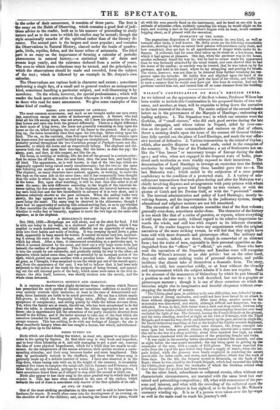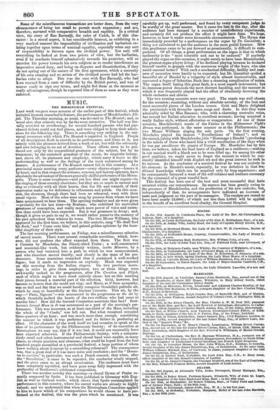WILSON ' S CONTINUATION OF MILL ' S BRITISH INDIA.
As we inferred on the appearance of the first volume, Professor Wilson has been unable to include this Continuation in his proposed limits of two vol- umes, and another, at least, will be requisite to bring down the narrative to the last renewal of the charter. The entire subject of the second volume before us is the government of the Marquis of Hastings ; embracing six leading subjects. 1. The Nepaulese war; in which our enemies were the
Gorkhas, of " small stature," who did such good service during the late Scinde campaign, and whose valour in Nepaul, aided by over-c an- tion on the part of some commanders and rashness on that of others, threw a seeming doubt upon the issue of the contest till General Ochter- lony fully carried out the plans of Lord Hastings, and made the war offen- sive instead of defensive. 2. Various transactions in the island of Ceylon; which, after sundry disputes on a small scale, ended in the conquest of the country. 3. The war of the Pindarries ; a set of freebooters not un- like the " free lances " or mercenary troops of Europe during the dark ages ; and who, when not engaged in the frequent wars of India, plun- dered such territories as were readily exposed to their incursions. The determination of Lord Hastings to revenge an excursion into the British territories by condignly punishing these banditti gave rise to-4. The last Mahratta war; which ended in the subjection of a once potent confederacy to the condition of a protected state. 5. A variety of mis- cellaneous transactions that took place during and after the Mahratta war; chiefly involving disputes and arrangements with petty princes with whom the extension of our power had brought us into contact, or with the pirates of Cutch and the Persian Gulf, or with the " protected " states. 6. The internal administration and policy of Lord Hastings ; mostly in- volving finance, and the improvements in the judicatory system, though educational and religious matters are not left unnoticed. The execution of all these subjects resembles that of the first volume; generally over-done, sometimes under-done. The character of the history is too much like that of a series of gazettes, or reports, where everything is told upon the same scale, without regard to its relative importance to- wards the whole, and still less with respect to its inherent character. Hence, if the reader happens to have any acquaintance with the original narratives of the more striking events, he will feel that they might have been told with more dramatic and picturesque effect. The military and political results, indeed, are there, though in somewhat of an abstract form ; but the traits of men, especially in their personal capacities as dis- tinguished from the " officer " or "official," are sunk. Those who have read the narratives of the Nepaulese and Kandian wars will recognize Professor Wilson's account as an able précis : but on the other hand, they will miss many striking traits of personal character, and public incidents that almost take of themselves a dramatic form. The story, indeed, is told, but somewhat coldly, or at least without the vivacity and empressement which the subject admits if it does not require. Such is the account of the manoeuvre of Ochterlony by which he put himself in a position to end the war : it is well described, but not in a graphio or picturesque manner ; though it is one of those occasions on which the historian might rise to imaginative and forceful eloquence without over- stepping the modesty of nature. "The Chiria-ghati pass, in addition to its own difficulties, was defended by suc- cessive tiers of strong stockades, and could not have been forced by an attack in front without disproportionate loss. After some delay, another access to the mountains was discovered, and which, although difficult and dangerous, was un- defended. It was, in fact, little better than a dark and deep ravine, between lofty and precipitous banks clothed with trees, whose intermingling branches over head excluded the light of day. The General, leaving the Fourth Brigade on the ground, and his tents standing, marched at night on the 14th of February, with the Third Brigade, and wound his way slowly and laboriously up the pass, almost in single file; Sir David Ochterlony marching on foot at the head of the Eighty-seventh Regiment, leading the column. After proceeding some distance, the troops emerged into more open but broken ground, whence they again entered into a watercourse: this led to the foot of a steep acclivity, about three hundred feet high, up which the advance clambered with the assistance of the projecting boughs and rocks. " It was eight in the morning before the advance reached the summit, and nine at night before the rear-guard ascended; the day being spent in getting up the remainder of the men, with a couple of field-pieces. The troops marched five miles from the top of the pass before they found a supply of water; when the bri- gade halted, while the pioneers were busily employed in rendering the ascent practicable for laden cattle, and stores, and ammunition; which was the work of three days. On the 4th, the General moved to Hetannda, on the bank of the Rapti; where he was joined by the Fourth Brigade, which had mounted the hills by the Chiria-ghati pass; from the stockades of which the Gorkhas retired when they found that the position had been turned."
On the other hand, subordinate or collateral events, often without any characteristic circumstances, are narrated with the same level but sus- tained and painstaking composition ; till, what with remoteness of the per- sons and interest, and what with the crowding of the collateral upon the principal, the entire picture is lost sight of, or to be found in Mr. Wilson's summary winding up. It is as if a person were taken over the by-ways as well as the main road to reach his journey's end. Some of the miscellaneous transactions are better done, from the very circumstance of being too small to permit much (=pension ; and are, therefore, narrated with comparative breadth and rapidity. In a critical view, the story of Rao Barmalji, the ruler of Catch, is of this cha- racter : in a moral aspect, it has considerable interest, as exhibiting in a very marked manner the impossibility of civilization and barbarism ex- isting together upon terms of nominal equality, especially when any sort of responsibility is thrown upon the civilized power. Not only will everything be looked at from two points of view, but the barbarian, even if he conducts himself submissively towards his protector, will so exercise his power towards his own subjects as to render interference an imperative moral duty, and bring on disputes and dissatisfaction, if they do not spring out of the nature of the first agreement, which a necessity of his own creating and no action of the civilized power had led the bar- barian ruler to adopt. This was the case with Rao Barmalji, who had b3en rescued from a state of difficulty by the British power, and was of course ready to sign any terms, and might feel them at the moment as really advantageous, though he repented him of them as soon as they were enforced.



























 Previous page
Previous page